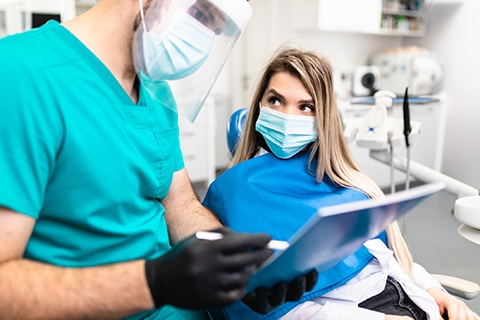
In December 2020, news started coming out about reactions of dermal filler patients who had recently received their SARS-CoV-2 mRNA vaccination which caused a bit of a panic. In fact, only 3 participants out of a group of 15,184 experienced lip or facial swelling in the area injected with a Hyaluronic acid (HA)-based dermal filler. These 3 participants were successfully treated with oral antihistamines or corticosteroids.i The FDA and the American Society for Dermatologic Surgery (ASDS) released guidance for patients and practitioners about the dermal filler reactions and what to do moving forward.ii
It is important for dermal filler patients to understand that the mild swelling reactions developed by the 3 patients who received Moderna’s COVID vaccine were not life-threatening allergic reactions. Also, the rare cases of mild swelling noted by the ASPS and ASDS occurred a day or even days after receiving the vaccine. There were also reports of potential Pfizer and Moderna COVID-19 vaccine-related skin reactions occurring at the injection site of cosmetic injectable fillers.iii However, similar skin reactions have been reported after flu vaccinations and viral illnesses and neither reaction should not be considered a reason to discourage any vaccination.
Have BOTOX® Cosmetic Patients Had Reactions After Vaccination?
So far, there is no known case of a reaction between the SARS-CoV-2 mRNA vaccinations and BOTOX® Cosmetic. However, many patients do not understand the differences between a neuromodulator injectable like BOTOX® and a dermal filler injectable. Therefore, most medical practices and pharmacies that administer the vaccines have determined that the 2-week wait period before and after a vaccination should be observed by BOTOX® patients also out of an abundance of caution.
Best Practices for Your Patients
What have you been doing in your practice to alert your patients and assist them in making informed decisions about scheduling their future dermal filler injections?
PUMC recommends the following:
-
- 1. If a patient is calling to schedule an injectable treatment, verify that they will not be receiving a SARS-CoV-2 mRNA (Pfizer or Moderna) vaccination or booster at least 2 weeks before or after any planned dermal filler injection. Many Americans have already received their first 2 doses of the COVID vaccine. However, there are also those who opted to wait and are only now just getting their first doses. Never assume anything. During their consultation, get their pertinent medical history, including vaccination history, so that you can determine if they are within the threshold of being able to receive a dermal filler treatment. Keep in mind that if they are between their 1st and 2nd dose, there will not be time to safely receive a dermal filler injection without the rare potential for reaction.
2. When they call to schedule an appointment, ask what their rejuvenation goals are and when they need to be camera-ready and note this in their file. Patients may be upset to find out that fillers are not an option for them as this could seriously disrupt their plans. Being understanding of their feelings and patiently listening to their complaints could potentially avoid a negative online review for you or your practice. It won’t matter that this safety recommendation is out of your control. However, having some ready alternatives and solutions available to assist them with meeting their rejuvenation goals will go a long way towards alleviating their anger and stress.
3. Reassure your patients that they will be able to continue receiving dermal filler treatments in the future after the 2+ week wait period has elapsed. Dermal fillers have long been considered safe and will continue to be safe so long as they are injected by board-certified physicians who are expert injectors.
4. Reassure your patients that it is still safe to get the COVID vaccine even though they have received injectable dermal filler treatments. Instances of reactions are rare. Similar reactions may occur with yearly flu shots and other vaccines. A reaction to any vaccination should be reported to their board-certified physician who will most likely recommend an oral antihistamine or corticosteroid to resolve the swelling.
In short, prepare your staff so that they are informed and ready to assist you and your practice. A few simple steps can save your practice from an unhappy patient who may leave a negative online review.
i ASPS Guidance Concerning FDA Reported Adverse Events in Patients with Dermal Fillers Receiving the SARS-CoV-2 mRNA Vaccine. Plasticsurgery.org
ii Avram, M., Bertucci, V., Cox, S.E., Jones, D., Mariwalla, K. Guidance Regarding SARS-CoV-2 mRNA Vaccine Side Effects in Dermal Filler Patients. American Society for Dermatologic Surgery. 28 Dec. 2020.
iii McMahon, D.E., Amerson, E., Rosenbach, M., Lipoff, J.B., Moustafa, D., Tyagi, A., et al., Cutaneous reactions reported after Moderna and Pfizer COVID-19 vaccination: A registry-based study of 414 cases. Journal of the American Academy of Dermatology. 7 Apr. 2021.
